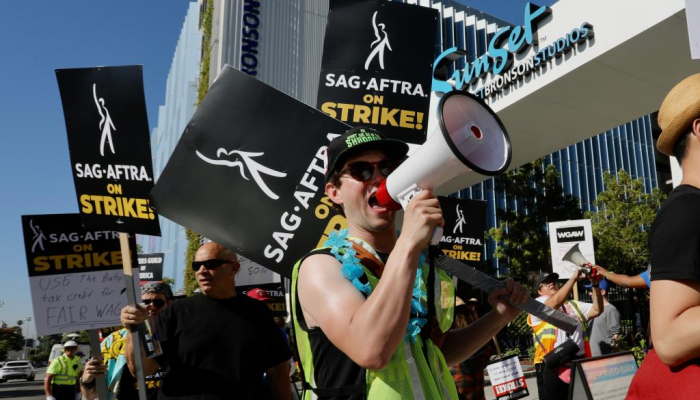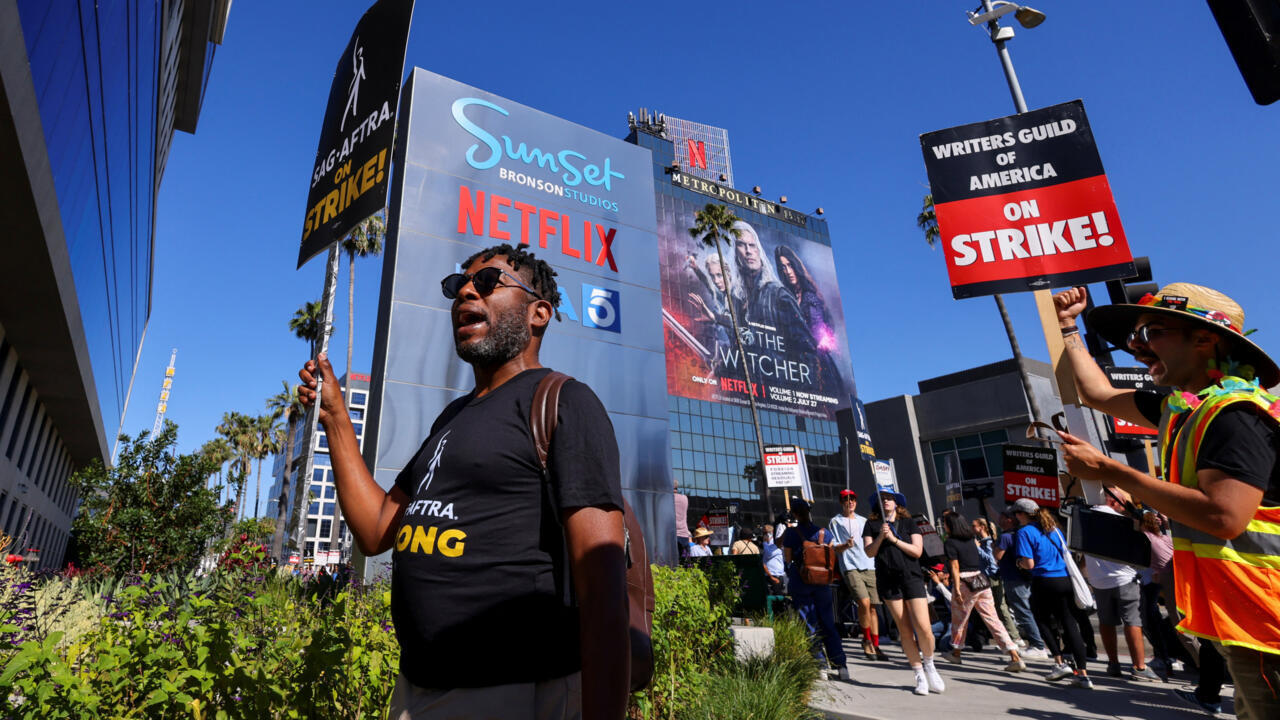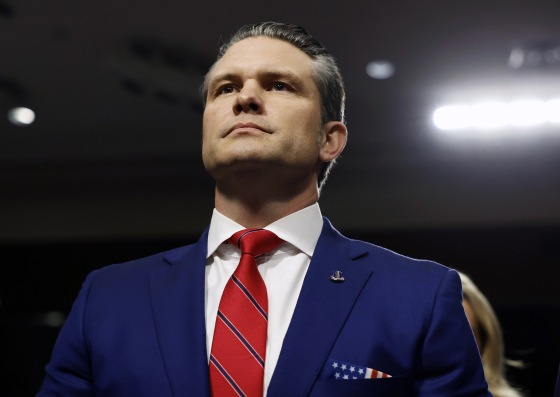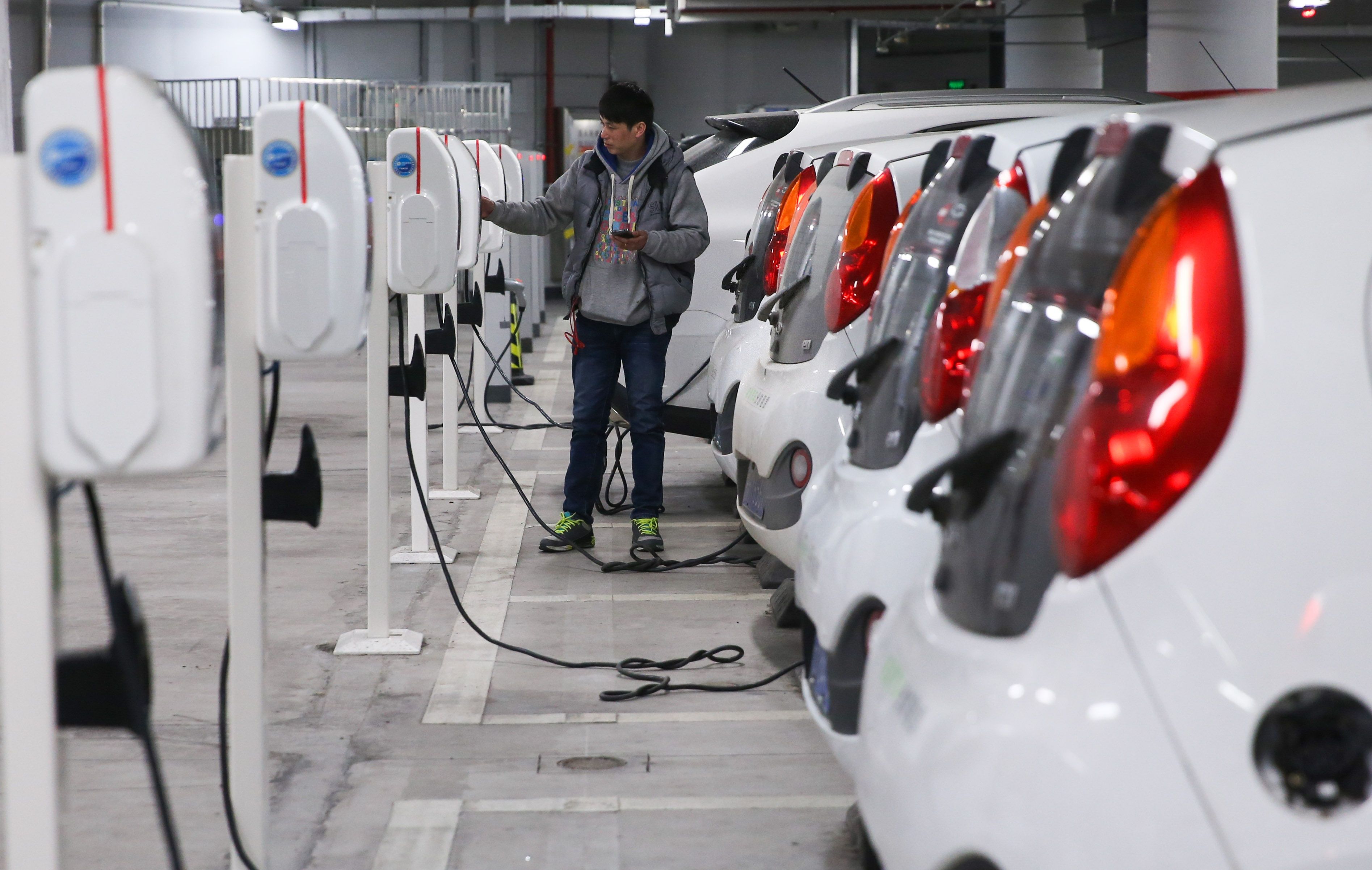Actors Join Writers' Strike: Hollywood Faces Complete Production Shutdown

Table of Contents
SAG-AFTRA Joins the WGA Strike: A United Front Against Industry Practices
SAG-AFTRA's decision to join the WGA strike represents a powerful show of unity against what the unions see as exploitative industry practices in the age of streaming. The actors' strike is fueled by similar concerns to the writers' strike, but with additional issues specific to the performance industry. Key demands include:
-
Fair Wages in the Streaming Era: Traditional residuals, which provided actors with a percentage of revenue from rebroadcasts and home video sales, have drastically diminished in the streaming era. Actors are demanding fairer compensation models that reflect the massive profits generated by streaming platforms. This includes increased backend participation and a more equitable share of streaming revenue.
-
AI Usage in Film and Television: The rapid advancement of artificial intelligence poses a significant threat to actors' livelihoods. SAG-AFTRA is demanding strict regulations on the use of AI, including protection against the unauthorized use of actors' likenesses and performances for AI-generated content. This is crucial to safeguard their work and prevent the devaluation of their skills.
-
Improved Working Conditions: Actors often face grueling working hours, excessive travel demands, and insufficient rest periods. The strike aims to improve working conditions, ensuring fair treatment and preventing exploitation.
-
Increased Health Insurance and Retirement Benefits: The unions are fighting for improved healthcare and retirement benefits that reflect the precarious nature of work in the entertainment industry, particularly for those who are not consistently employed.
The significance of this joint strike cannot be overstated. The combined power of writers and actors, the creative forces behind almost all film and television productions, brings Hollywood to a near standstill. This united front significantly increases the pressure on studios to negotiate seriously and address the unions' demands.
The Impact of the Hollywood Strike: A Ripple Effect Across the Industry
The Hollywood strike has already caused a significant and rapidly expanding ripple effect across the industry. The immediate impact is a complete, or near-complete, shutdown of film and television production. This has several consequences:
-
Delays in Upcoming Film and TV Releases: Numerous projects are already delayed, impacting release schedules and potentially causing significant financial losses for studios.
-
Financial Losses for Studios and Production Companies: Production shutdowns translate directly to substantial financial losses for major studios and smaller production companies alike.
-
Impact on Related Industries: The strike affects a vast network of related industries, including catering, transportation, location scouting, and post-production services, leading to job losses and financial hardship for many.
-
Job Losses for Non-Union Workers: While the strike directly impacts union members, many non-union workers supporting the industry, such as crew members, also face job losses due to the production halts.
-
Potential Disruption to Award Season: The timing of the strike could disrupt award season events and ceremonies, creating uncertainty for nominees and organizers.
The long-term consequences remain uncertain, but the prolonged shutdown could permanently alter the landscape of Hollywood, potentially leading to changes in production models and industry structures.
Potential Resolutions and the Path Forward: Negotiating a Fair Deal
Resolving the strike requires a commitment from both sides to negotiate fairly and find common ground. Potential solutions include:
-
Fair Compensation Models for Streaming Revenue: Developing new, transparent, and equitable models for compensating actors and writers for their work on streaming platforms is essential. This could involve profit-sharing arrangements, minimum guarantees, or other innovative compensation structures.
-
Clear Guidelines on AI Usage in the Industry: Establishing clear guidelines on the ethical and legal use of AI in film and television is crucial to protect the rights and livelihoods of actors and writers.
-
Improved Working Conditions and Benefits for Actors: Implementing policies that improve working conditions, reduce excessively long working hours, and provide fair compensation for travel expenses is essential.
-
Mediation Efforts by Industry Leaders or Government Officials: Intervention by neutral third parties, such as experienced mediators or government officials, could facilitate productive negotiations and help bridge the gap between the unions and studios.
The duration of the strike and its ultimate outcome remain highly uncertain. The outcome will depend heavily on the willingness of both sides to compromise and find mutually acceptable solutions.
The Public's Role: Supporting the Actors' and Writers' Strike
The public plays a crucial role in supporting the actors' and writers' strike and ensuring a fair outcome. Here are several ways to show your support:
-
Boycott Affected Productions or Companies: Consider boycotting films and television shows produced by studios that are resisting fair negotiations.
-
Support Independent Films and Television: Support independent filmmakers and smaller production companies who are not directly involved in the dispute.
-
Follow and Engage with News Updates on the Strike: Stay informed about the progress of negotiations and the impact of the strike on the industry.
-
Support the Unions Financially or Through Volunteer Work: Consider donating to the WGA and SAG-AFTRA to support their efforts and help sustain their members during the strike.
By actively supporting the unions, the public can amplify the message and help achieve a more equitable and sustainable future for the entertainment industry.
Conclusion
The joint actors' and writers' strike represents a significant turning point in the entertainment industry. Driven by concerns over fair wages in the streaming era, the unchecked use of AI, and exploitative working conditions, this unprecedented Hollywood strike has brought almost all production to a halt. The impact reverberates across the industry and beyond, impacting countless workers and businesses. The path forward requires a commitment to negotiation, compromise, and a shared vision for a more equitable and sustainable future. Stay informed about the ongoing actors' strike and writers' strike, understand the complexities of this Hollywood strike and support the unions' efforts to achieve fair compensation, protect creative workers’ rights, and improve working conditions in the film and television industry.

Featured Posts
-
 American Battleground A Fight For Power Against The Worlds Wealthiest
Apr 26, 2025
American Battleground A Fight For Power Against The Worlds Wealthiest
Apr 26, 2025 -
 Double Trouble In Hollywood The Impact Of The Writers And Actors Strike
Apr 26, 2025
Double Trouble In Hollywood The Impact Of The Writers And Actors Strike
Apr 26, 2025 -
 Exclusive Pentagon Chaos Shakes Pete Hegseth Amidst Polygraph Threats And Leaks
Apr 26, 2025
Exclusive Pentagon Chaos Shakes Pete Hegseth Amidst Polygraph Threats And Leaks
Apr 26, 2025 -
 The Rise Of Chinese Automakers A Look At Their Global Impact
Apr 26, 2025
The Rise Of Chinese Automakers A Look At Their Global Impact
Apr 26, 2025 -
 The Shifting Sands Of The Chinese Automotive Market Implications For Bmw Porsche And Competitors
Apr 26, 2025
The Shifting Sands Of The Chinese Automotive Market Implications For Bmw Porsche And Competitors
Apr 26, 2025
